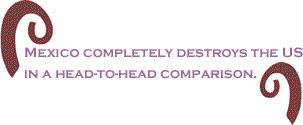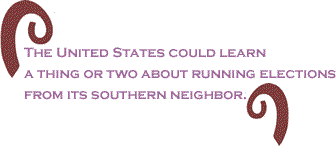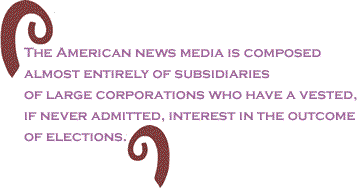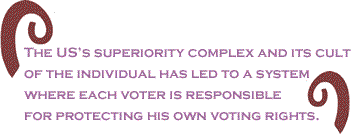
|
|||||||||||||||||||||
 |
|||||||||||||||||||||
 |
|||||||||||||||||||||
 |
|||||||||||||||||||||
 |
|
This article originally appeared in Intelligence Squad Reports, of which Mr. Grayman is publisher. As we all know, Mexico held its presidential election early this month. The official results show the conservative candidate with an extremely small margin over the liberal one. A color-coded map of the state-by-state results shows a North/South regional divide. And there has been a request by the second place candidate for a recount. Sound familiar? Well, despite the dramatic similarities between the outcome of this election and the notorious 2000 US election debacle, the fact is that Mexico’s and the U.S.’s elections processes are about as similar as a jalapeño pepper and a celery stalk. In fact, Mexico’s elections process is far superior to that of the United States. Regardless of the bad feelings spurred by the current immigration debate between those two countries, the United States could learn a thing or two about running elections from its southern neighbor. Check it: CAMPAIGN FINANCE – Mexico has a $60 million spending limit for candidates, which means that a candidate who either is ultra-wealthy or who champions the cause of ultra-wealthy campaign contributors does not have an automatic advantage over a candidate who is not wealthy and who champions the cause of the non-wealthy.
In the United States, such limits are rejected – ridiculously, in our opinion – as an infringement on the right of "free speech." Just for the record, Mexican politicians freely and regularly criticize each other, Mexican activists regularly and freely criticize the government, and Mexican citizens regularly and freely criticize both. There are no fears in any circle that a $60 million limit – which, given the relatively weak Mexican economy, is like $130 - $150 million in the US (depending on how it’s spent) – represents any significant infringement on access to "free speech" in Mexican society. ADVERTISING – Mexico’s Federal Election Institute (IFE) issues five-figure fines against candidates for running blatantly deceptive campaign ads. In the US, the news media sometimes serve this role of checking against the misleading of the voters.
Combined with the abovementioned spending caps, the IFE’s fines pressure all candidates to take extra care that their campaign ads are accurate in characterizing their opponents. In America, the only certain method of dealing with misleading ads is for the opposing candidate to release his own ads in response, which leads to upward-spiraling campaign costs and the consequent unfairness described above. REGISTRATION – In the US state of Georgia, the Republican-led government passed a law requiring all voters to purchase a government-issued identification card. Exemptions for the poor are vaguely-worded, and there are currently no permanent locations to obtain the card anywhere in the state’s largest city of Atlanta. Just this month, the courts struck the law down as an undue burden on the rights of the poor. The state government plans to appeal the decision. In Mexico, voters are also required to obtain ID cards. But here’s the difference: they are FREE. And every state capital and major city has a location to obtain one. Georgia’s refusal to shape its ID law similarly can best be seen as a blatant attempt to limit access to the ballot box among the state’s poor – especially the urban poor, who are famously not Republican voters. Many other US states are watching closely to see whether Georgia can pull off its disenfranchising trick, poised to replicate it if they can.
REPRESENTATIVES – The United States uses geographically-based single-member election districts to construct its House of Representatives. This leads to millions of Americans (for example, conservatives living in New York City, or blacks living in northern Louisiana) living under representatives who do not actually represent their interests. In Mexico, 40% of the members of its version of the House are allocated by proportional representation, a system in which voters chose representatives based not on where the candidate lives but on what the candidate stands for. This allows voters, no matter how geographically-isolated they may be from like-minded voters, to select a candidate who accurately reflects their political preferences. VOTING TECHNOLOGY – In the wake of the 2000 Florida punch card fiasco, states across the US began rushing out to purchase chad-free electronic voting machines. This solution is infinitely worse than the problem it purports to address for the simple reason that there is literally no way to know whether the machine is accurately recording the votes that the voters are casting. A "paper trail," in which the machines print out paper records of each vote cast, doesn’t change this equation much because those receipts would be examined only in the relatively rare case of a recount. In Mexico, they vote on paper ballots marked by hand and counted by hand. This is the ONLY secure way to run an election. Despite the time it may take to count the ballots, they realized a long time ago that using any electronic means, including optical scan technology, introduces an inscrutable and potentially unaccountable player into the process (in fact, it was the use of computers to rig the 1988 presidential election there that led to the sweeping reforms and the superior processes we’re describing throughout this dispatch). POPULAR VOTE – Mexico uses the popular vote to determine the president: whoever gets the most votes wins. Period. The US uses an anachronistic and racist system called the Electoral College to pick its president. In grouping votes by state, this system turns large numbers of votes into "wasted" votes for candidates who have already won the state in question. It also makes every vote cast by the minority in each state a "wasted" vote. This system has the potential to distort – and even contradict – the will of the electorate in close elections, as we saw in the year 2000, and nearly saw in 2004 (if 60,000 Ohioans had voted differently, Kerry would have won despite officially collecting 3 million fewer votes than Bush). ADMINISTRATION – the IFE is a nonpartisan entity responsible for administering Mexico’s national election law. In the US, the government of each state administers elections, even national elections. The obvious conflict-of-interest arising from this situation has manifested itself most notoriously in recent years in Florida and Ohio, where the chief elections officers – who were also partisans working on behalf of one of the candidates – toyed with the interpretation of their state laws to help their candidate. Each time such behavior is allowed to effect the results of a national election, America’s trust in its electoral process takes a major hit.
No election system is perfect, not even Mexico’s. Witness, for example, its badly-formed process of handling recounts: There is no provision in Mexico law for a ballot-by-ballot recount, and the only time any ballots are ever reviewed at all following the initial, uncertified, tally is when the totals written on the precinct tally sheet are illegible or appear to have been altered. Nevertheless, Mexico completely destroys the US in a head-to-head comparison. That’s because decades of open fraud and corruption caused a backlash that led Mexico to create a system in which the act of voting is treated as a vital right to be protected by the government against all foreseeable attacks. In contrast, the US’s superiority complex and its cult of the individual has led to a system where each voter is responsible for protecting his own voting rights against any forces, no matter how powerful they may be, aligned against it – not to mention a national culture which refuses to accept that candidates, no matter how honest they appear on the surface, are capable of the most underhanded and anti-democratic tactics. As residents of the United States, we will continue to fight for a process that measures the will of the people more accurately than the piece of garbage we currently use. Hope you’ll join us. |
|
| Home | |
Your comments are always welcome. Visit the Contact Us page to send e-Mail or Feedback or Click here to send e-Mail to [email protected] e-Mail re-print notice
If you send us an e-Mail message we may publish all or part of it, unless you tell us it is not for publication. You may also request that we withhold your name. Thank you very much for your readership. |
|
| July 20, 2006 Issue 192 |
||||||||||||||
|
||||||||||||||
|
||||||||||||||
| Printer Friendly Version in resizeable plain text format | ||||||||||||||
 |
||||||||||||||
 |
||||||||||||||
 |
||||||||||||||
 |
||||||||||||||
| |
||||||||||||||
| |
||||||||||||||































